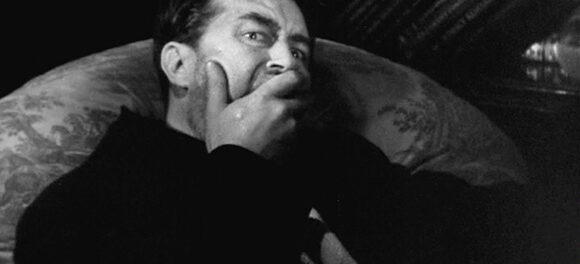The Lost Weekend (1945)
[6]
Maestro Billy Wilder directs Ray Milland as a drunk writer circling the drain in the multi-Oscar-winning The Lost Weekend. Milland’s character is supposed to begin recovery on a long holiday weekend with his brother (Phillip Terry) and gal pal (Jane Wyman), but after he steals money to spend at his favorite bar, he gets drunk and misses their departure time. Things get progressively worse as he begins pawning his possessions for drink money and ignoring Wyman’s phone calls and messages. The third act sees Milland hit bottom, presented with a decision of life or death.
One of the reasons I love Billy Wilder is for his eclectic choice of material, and an exploration into alcoholism is certainly a worthy topic. But while I enjoyed the film as a moody film noir piece, I was honestly expecting something a little more personal or moving than what The Lost Weekend offers on the subject. There’s not a character-driven reason for Milland’s descent into madness other than the mere presence of whiskey or his desire for it. It’s not filling a void, it’s not helping him forget anything. It’s just the enigmatic villain of the movie, much like Michael Myers in a Halloween movie or the shark in Jaws. Wilder even portrays the drink with eerie theremin-driven music by Miklós Rózsa, suggesting it has an otherworldly effect on its victims.
Alcoholism is admittedly an addiction I know nothing about, but in the context of a movie, I thought it might be more compelling to see it as a tool of purposeful self-destruction rather than a unstoppable monster you can’t avoid. I needed to see more of a reason for Milland’s character to want to live — how was his writing career doing? How much does Jane Wyman’s character care about him? Is he possibly in love? Both his career and his relationship with Wyman are a bit vague. I didn’t feel he had much reason to live, or to die.
While it’s not everything I wanted it to be, The Lost Weekend is undeniably a victim of high expectations — a film from the director of Sunset Boulevard, Some Like It Hot, The Apartment, and Stalag 17. It’s a stylish descent into madness that features fine cinematography and music. Milland teeters on over-acting a few times, but ultimately paints a compelling portrait of a man’s journey from obsession to self-contempt, and finally to grim resolution. Howard Da Silva and Doris Dowling are memorable in supporting roles.
Academy Awards: Best Picture, Best Actor (Ray Milland), Best Director, Best Screenplay
Oscar Nominations: Best Cinematography (Black & White), Best Film Editing, Best Musical Score (Miklós Rózsa)


